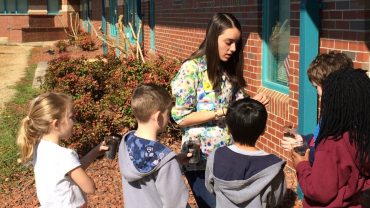Education for Agricultural Professionals
Have you ever thought about being a teacher? Would you like a job where there are plentiful employment opportunities? Would you like the opportunity to work with both agriculture and people? Would you like a career where you can inspire young people and feel like you have accomplished something important at the end of the day? If you answered Yes to any of these questions, LEAP (Licensure in Education for Agricultural Professionals) may be the program for you.
LEAP is a web-based, teacher certification program in agricultural education offered through NC State University. The program is available nationwide and is delivered through online education technologies. LEAP is academically challenging and requires a serious commitment from those enrolled. The program certifies individuals who have baccalaureate degrees in agriculture, natural resources and closely related disciplines to teach agriculture in school settings.
The ultimate goal of this program is to increase the supply of qualified agricultural education teachers. There is a national shortage of agriculture teachers. Students who successfully complete the program will receive a class "A" teaching license from the state of North Carolina. The North Carolina teaching license is recognized by 45 states, Department of Defense schools, and the U.S. Territories. The teacher education program at North Carolina State University is accredited by the National Council for Accreditation of Teacher Education.
This program may lead to Professional Licensure.
Eligibility
Step 1
Send transcripts of your academic work to Misty Lambert: mdlamber@ncsu.edu or Desiree Mallon: ddmallon@ncsu.edu (unofficial copies are OK). We will then create a LEAP Plan listing the coursework you have credit for and the remaining required coursework needed for your licensure.
Step 2
You must apply for admission to NC State University. You have three options:
- Enroll in the Agricultural and Extension Education graduate certificate program. This is a formal graduate program. You will need to complete a Graduate School application (opens in new tab) online. In the “Application and Test Information” section, click on “Graduate Certificate,” and then select “Graduate Certificate: Agricultural and Extension Education.” With this option, you will be recognized as a student in our department and will be assigned an advisor. Upon completion, you will also receive a certificate from NC State. Note that Graduate Certificate students register for classes after degree-seeking students, but before NDS students. Our Graduate Certificate requires 15 graduate-level credit hours and must be completed within four years. An undergraduate degree must be conferred prior to application review. A 3.0 undergraduate GPA is required for admission into the Graduate School.
- Enroll as a Non-Degree Studies student. Visit the Office of Registration and Records website for more information about enrolling in Non-Degree Studies. NDS students do not receive priority in enrolling in courses and do not qualify for financial aid. NDS students are limited to two (2) courses per semester and are not considered students in the Department of Agricultural and Human Sciences. Therefore, non-degree students will need to take the initiative to contact an advisor in our department because they do not appear on our advising rosters. This route is ideal for students who have less than 15 credit hours needed to complete LEAP or cannot complete the program within four years.
- Enroll in the Agricultural and Extension Education master’s degree program. The application process for a master’s degree in Agricultural and Extension Education is the same as for the graduate certificate program. This option is ideal for students who are already considering earning a master’s degree but must be completed within six years. A 3.0 undergraduate GPA is required for admission into the Graduate School.
Note: A student can enroll in non-degree studies or the graduate certificate program and then apply to the AEE master’s program at a later date. A total of twelve (12) credit hours taken as NDS or in the graduate certificate program can be applied in the master’s program, but only six (6) NDS credit hours can apply towards the graduate certificate program. The time limit to complete a master’s (6 years) or certificate (4 years) program begins with the earliest course applied towards said program.
Step 3
After admission to the university, students work with their LEAP advisor to register for classes.
Plan of Study
LEAP requires 21 credit hours and may take from four to seven academic terms to complete. 24 credit hours of agriculture content is also required for an agricultural teaching license. If these hours are not met prior to applying to the program, you can add these content courses to your LEAP program hours. NC State’s College of Agriculture and Life Sciences offers several introductory agriculture courses at a distance which can be taken to satisfy the 24 credit hours needed.
To remain in the LEAP program, students must maintain a 2.75 GPA in all LEAP courses. Only courses in which you earn a grade of “C” or higher can be counted toward licensure requirements.
Career Prospects
The Licensure in Education for Agricultural Professionals program is tailored to professionals who have a bachelor’s degree and seek licensure to teach agriculture in a middle or secondary school. In response to the national demand for licensed agricultural education teachers, the ultimate goal of this program is to increase the supply of qualified middle and high school teachers. LEAP certifies individuals who have baccalaureate degrees in agriculture, natural resources and closely related disciplines to teach agriculture in public, private, and charter schools.
Graduates of this program receive a Class “A” teaching license from North Carolina, which has reciprocity in 45 other states, the exceptions being Alaska, Iowa, Kentucky, Minnesota, and Texas (though all states can be licensed).
